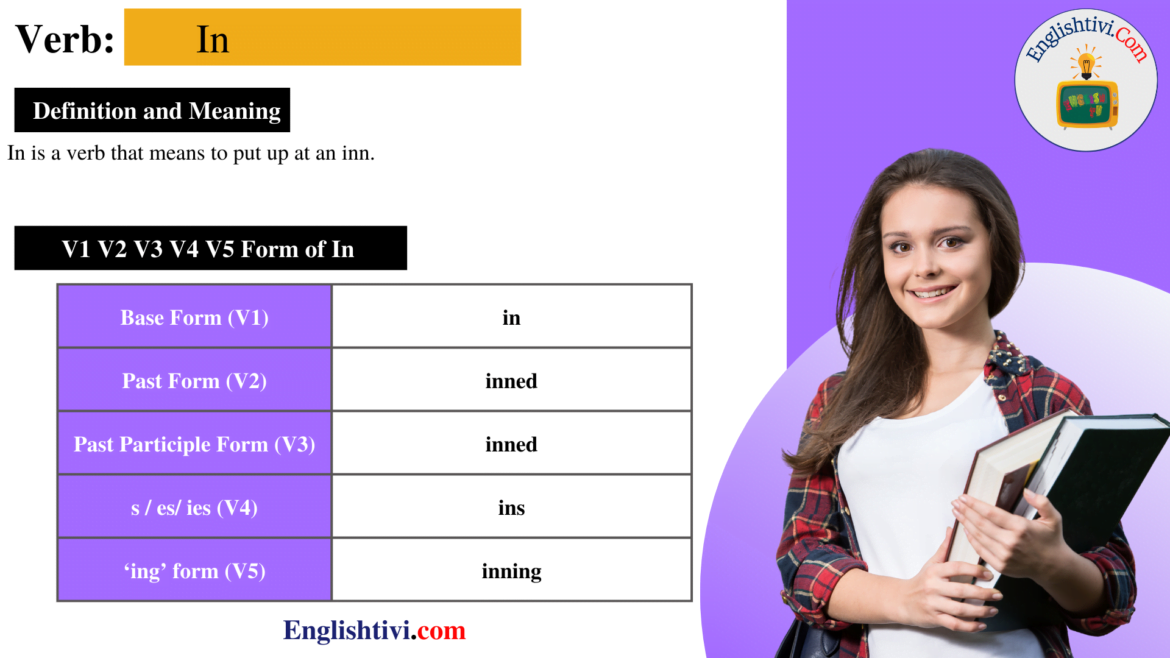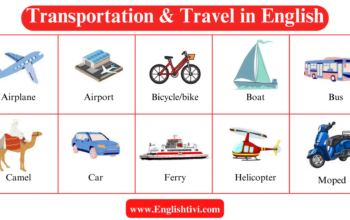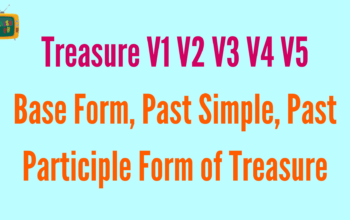⏩ Sign Up to Get Bonus
See more at: Verbs
In of Definition and Meaning
In is a verb that means to put up at an inn.
V1 V2 V3 V4 V5 Form of In
| Base Form (V1) | in |
| Past Form (V2) | inned |
| Past Participle Form (V3) | inned |
| s / es/ es (V4) | ins |
| ‘ing’ form (V5) | inning |
In of Past Simple V2
The verb in is also employed in its V2 form as “inned”. It is used to indicate the past tense in sentences.
In of Past Participle V3
This verb’s V3 form is “inned‘. In the case of past perfect tense or present perfect tense, the word “inned“ is used.
+ In the present perfect tense, the word in is used ‘have +’ inned” or ‘has +’ inned.’
- I, you, and we are used as ‘have + ‘ inned‘ subjects.
- He, she, and it are used as ‘has +” inned” subjects.
+ If you need to use the past perfect tense, use ‘had +” inned‘ regardless of the subject.
You might also like: ALL the English Grammar Basics You Need
Conjugation of In V1 V2 V3 V4 V5
| Conjugation table: In | |||
| Number | Singular | ||
| Present Simple of in | I | You | She/He/It |
| in | in | ins | |
| Plural | |||
| We | You | They | |
| in | in | in | |
| Present Continuous of in | I | You | She/He/It |
| am inning | are inning | is inning | |
| Plural | |||
| We | You | They | |
| are inning | are inning | are inning | |
| Present Perfect of in | I | You | She/He/It |
| have inned | have inned | has inned | |
| Plural | |||
| We | You | They | |
| have inned | have inned | have inned | |
| Present Perfect Continuous of in | I | You | She/He/It |
| have been inning | have been inning | has been inning | |
| Plural | |||
| We | You | They | |
| have been inning | have been inning | have been inning | |
| Past Simple of in | I | You | She/He/It |
| inned | inned | inned | |
| Plural | |||
| We | You | They | |
| inned | inned | inned | |
| Past Continuous of in | I | You | She/He/It |
| was inning | were inning | was inning | |
| Plural | |||
| We | You | They | |
| were inning | were inning | were inning | |
| Past Perfect of in | I | You | She/He/It |
| had inned | had inned | had inned | |
| Plural | |||
| We | You | They | |
| had inned | had inned | had inned | |
| Past Perfect Continuous of in | I | You | She/He/It |
| had been inning | had been inning | had been inning | |
| Plural | |||
| We | You | They | |
| had been inning | had been inning | had been inning | |
| Future Simple of in | I | You | She/He/It |
| will/shall in | will/shall in | will/shall in | |
| Plural | |||
| We | You | They | |
| will/shall in | will/shall in | will/shall in | |
| Future Continuous of in | I | You | She/He/It |
| will/shall be inning | will/shall be inning | will/shall be inning | |
| Plural | |||
| We | You | They | |
| will/shall be inning | will/shall be inning | will/shall be inning | |
| Future Perfect of in | I | You | She/He/It |
| will/shall have inned | will/shall have inned | will/shall have inned | |
| Plural | |||
| We | You | They | |
| will/shall have inned | will/shall have inned | will/shall have inned | |
| Future Perfect Continuous of in | I | You | She/He/It |
| will/shall have been inning | will/shall have been inning | will/shall have been inning | |
| Plural | |||
| We | You | They | |
| will/shall have been inning | will/shall have been inning | will/shall have been inning | |
| Conditional Present of in | I | You | She/He/It |
| would in | would in | would in | |
| Plural | |||
| We | You | They | |
| would in | would in | would in | |
| Conditional Perfect of in | I | You | She/He/It |
| would have inned | would have inned | would have inned | |
| Plural | |||
| We | You | They | |
| would have inned | would have inned | would have inned | |
| Conditional Present Continuous of in | I | You | She/He/It |
| would be inning | would be inning | would be inning | |
| Plural | |||
| We | You | They | |
| would be inning | would be inning | would be inning | |
| Conditional Perfect Continuous of in | I | You | She/He/It |
| would have been inning | would have been inning | would have been inning | |
| Plural | |||
| We | You | They | |
| would have been inning | would have been inning | would have been inning | |
| Present Subjunctive of in | I | You | She/He/It |
| in | in | in | |
| Plural | |||
| We | You | They | |
| in | in | in | |
| Past Subjunctive of in | I | You | She/He/It |
| inned | inned | inned | |
| Plural | |||
| We | You | They | |
| inned | inned | inned | |
| Past Perfect Subjunctive of in | I | You | She/He/It |
| had inned | had inned | had inned | |
| Plural | |||
| We | You | They | |
| had inned | had inned | had inned | |
| Imperative of in | I | You | She/He/It |
| in | |||
| Plural | |||
| We | You | They | |
| Let’s in | in | ||
See more at: Vocabulary
Example Sentences with In V1 V2 V3 V4 V5
In this section, we will learn about in sentence examples:
- I will in this address
- The strawberries should be stemmed before they are inned to sell
- I've been inned here for 10 years
- He ins very joyful
- He's inning the rope over there
Synonym Words For In
Synonym of in word list. Here are a variety of words whose meaning is nearly the synonym of in:
- flavour of the month
- all the rage
- fashion in
- demand in
- great demand in
- vogue
- latest thing
- trend
- all the go
- a one-hit wonder
- cool
- hot
- a flash in the pan
Opposite Words For In
The antonym of in a word list. Here are some words that have nearly the opposite meaning as in:
You might also like: Best List of Irregular Verbs in English
Some Frequently Asked Questions About In (Verb)
What is the V1 V2 V3 V4 V5 of in?
The past tense of in is inned. The third-person singular simple present indicative form of in is inned. The present participle of in is inned. The past participle of in is inned.
| Base Form (V1) | in |
| Past Form (V2) | inned |
| Past Participle Form (V3) | inned |
| s / es/ ies (V4) | ins |
| ‘ing’ form (V5) | inning |
What is the V2 and V3 form of in?
+ The V2 and V3 form of in is “ inned” and “ inned“.
What is the sentence of in?
What is the past tense V2 of in?
+ The past tense of in is “inned“.
What is the past tense V3 of in?
+ The past participle of in is “inned“.
What is the present participle V5 of in?
+ The present participle of in is “inning”.
Conclusion
Let’s learn with English TV the structure of the verb In V1 V2 V3 V4 V5: Base Form, Past Simple, Present Continuous and Present Continuous and Present Continuous and Present Continuous forms. We wish you all the best of luck.





